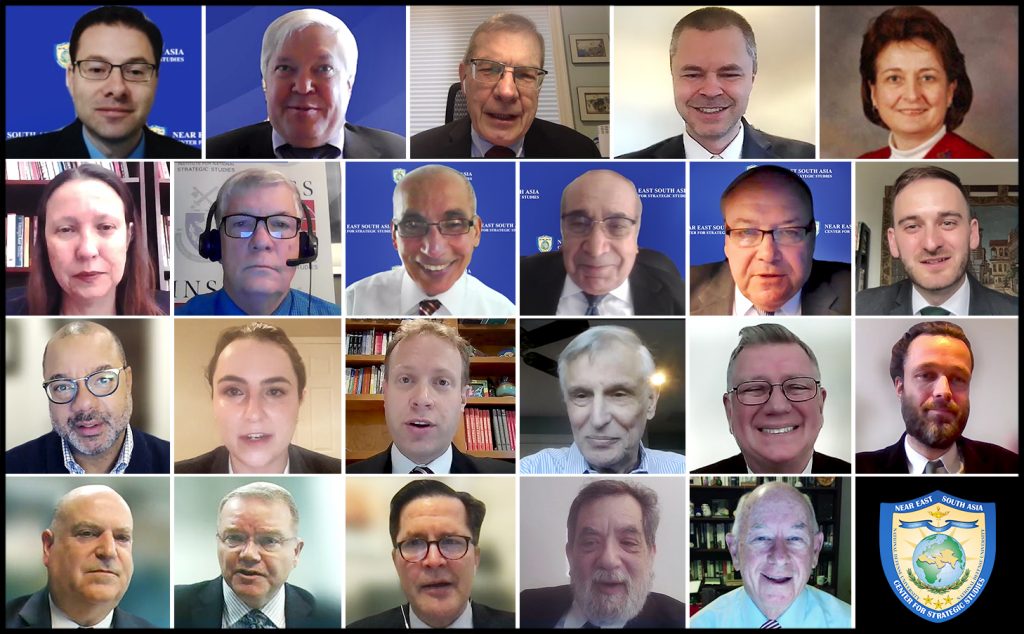Executive Seminar: Strategic Competition & Regional Cooperation
December 22, 2023 2023-12-22 10:08Executive Seminar: Strategic Competition & Regional Cooperation
Executive Seminar: Strategic Competition & Regional Cooperation
From 4–15 December 2023, the Near East South Asia (NESA) Center for Strategic Studies hosted the Executive Seminar (ES) “Strategic Competition and Regional Cooperation.” Throughout the two-week virtual event, the NESA Center hosted representatives from all over the world to discuss different topics in security and strategic studies. The NESA Center invited several experts with both academic as well as practical policy experience to discuss topics such as, but not limited to, understanding strategic competition; women, peace, and security; U.S.-China competition; transnational threats; disinformation; and cooperation opportunities in the economy, energy, and water. The seminar also covered the American political scene and domestic challenges the United States faces. The overarching theme for the event was to help participants from NESA countries gain a deeper understanding of the ongoing war in Ukraine, appreciate the complexity of the U.S.-China rivalry, and recognize the difference between the old Cold War and current strategic competition. The seminar also aimed to assess the strategic implications of global power competition on regional security.

Course Director Dr. Michael Sharnoff and his colleagues, NESA Center Distinguished Professor Amb. Ali Jalali and Professor Dr. Gawdat Bahgat, moderated the sessions. After each presentation, about 30 minutes were reserved for moderated discussion that was off-the-record (under Chatham House rules of non-attribution), where participants were encouraged to contribute to the discussion.
During the seminar, experts and participants discussed the emerging global trends. The seminar highlighted how China’s economic challenges and, the world’s growing environmental problems will affect current strategic competition. Furthermore, while discussing strategic competition, the seminar reviewed how alliances in the Middle East, South Asia, and alliances such as BRICS will impact current strategic competition. In addition, the seminar highlighted the nature of transnational threats such as the captagon drug trade and terrorism. How state and non-state actors are weaponizing media for disinformation was also discussed. Moreover, the seminar attempted to discuss challenges to America’s domestic politics which will inadvertently impact America’s foreign policy orientation. Toward the end of the seminar, faculty engaged in an open-ended discussion about U.S. foreign policy and current challenges in the international sphere.
Professor Anne Moisan held a Women, Peace, and Security (WPS) online round table on 4 December 2023 with ten women from eight countries. The discussion focused on the use of violence against women to instill fear and intimidation in communities, especially in conflict areas. Despite 23 years after the signing of UN Resolution 1325 focused on the protection of women and girls, violence against women has continued unchecked. Conflicts are only resolved in the long term when women, the most impacted by conflict, are at the peace table and actively participate in negotiating.
The seminar included 70 participants from 30 countries including Algeria, Armenia, Bahrain, Bangladesh, Brazil, Burundi, Cabo Verde, Canada, Comoros, Croatia, Cyprus, Egypt, Georgia, Ghana, Italy, Kazakhstan, Kosovo, Madagascar, Malawi, Maldives, Mauritania, Moldova, Morocco, Nepal, Pakistan, Seychelles, Slovenia, Sri Lanka, Turkmenistan, and Yemen. Regarding WPS numbers, 20% of participants who completed the course were female. The ES seminar provided a venue for partners to listen and learn about strategic competition and to consider potential areas of regional cooperation.
Read more about other NESA Center Executive Seminars.






